T. Boyle - Riven Rock
Здесь есть возможность читать онлайн «T. Boyle - Riven Rock» весь текст электронной книги совершенно бесплатно (целиком полную версию без сокращений). В некоторых случаях можно слушать аудио, скачать через торрент в формате fb2 и присутствует краткое содержание. Год выпуска: 1999, Издательство: Penguin Books, Жанр: Современная проза, на английском языке. Описание произведения, (предисловие) а так же отзывы посетителей доступны на портале библиотеки ЛибКат.
- Название:Riven Rock
- Автор:
- Издательство:Penguin Books
- Жанр:
- Год:1999
- ISBN:нет данных
- Рейтинг книги:5 / 5. Голосов: 1
-
Избранное:Добавить в избранное
- Отзывы:
-
Ваша оценка:
- 100
- 1
- 2
- 3
- 4
- 5
Riven Rock: краткое содержание, описание и аннотация
Предлагаем к чтению аннотацию, описание, краткое содержание или предисловие (зависит от того, что написал сам автор книги «Riven Rock»). Если вы не нашли необходимую информацию о книге — напишите в комментариях, мы постараемся отыскать её.
Riven Rock — читать онлайн бесплатно полную книгу (весь текст) целиком
Ниже представлен текст книги, разбитый по страницам. Система сохранения места последней прочитанной страницы, позволяет с удобством читать онлайн бесплатно книгу «Riven Rock», без необходимости каждый раз заново искать на чём Вы остановились. Поставьте закладку, и сможете в любой момент перейти на страницу, на которой закончили чтение.
Интервал:
Закладка:
Next they tried a fleshless sun-blasted old man who used to run a chuckwagon for sheepherders in the Goleta foothills, but all he knew how to cook was mutton, and after a week of that — boiled, fried, fricasseed, roasted and baked in a clay pit till it was mummified — they took to calling in orders at Diehl’s Grocery, three meals a day. Finally, deeply frustrated and in high dudgeon, Dr. Brush took O‘Kane aside one afternoon and asked him what he thought of hiring a woman — just to do the cooking and the kitchen work.
“A woman?” O‘Kane repeated, as if they were speaking of some alien species, and he was thinking of Elsie Reardon and the other female maids they’d had in the early days. It seemed so long ago. So long it was as if the prohibition against women had been written in stone and brought down from the mountaintop.
“Yes,” Brush shouted, and he was impatient with all this, resentful of having to act as estate manager and majordomo of the house as well, when it was clearly his duty as a trained psychiatrist to devote himself to higher things, for the main and simple reason that that was what he’d been trained and hired to do. He gave O‘Kane an exasperated look. “Mr. McCormick has been, well, calmer lately,” he said, “aside of course from the unfortunate incident with the cook, that is, and if we give strict orders that the woman is not to leave the kitchen under any circumstances and keep a sharp and vigilant eye on the patient, well, I don’t see any reason why we can’t, well, employ a female here. It’s clear we can’t go on like this.”
O‘Kane watched him a moment, trying to gauge the extent of the doctor’s agitation, and then he shrugged. “Sure,” he said. “Why not?”
And so it was that he came into the house the next morning to a smell of sauces and spices and fresh baked bread so intoxicating he thought he would faint with the anticipation of it, real food — Italian, it smelled like — and not the unvarying and nameless crud Mrs. Fitzmaurice served up at the boardinghouse. He let himself in upstairs and carefully locked the door behind him, a woman in the house again and this no time to be lax or forgetful, and found Mart reading to Mr. McCormick out of a book of Shakespeare’s plays. They both looked tranquil and they both turned their heads to smile at him as he swung away from the door and came into the room. “Good morning, Mart, Mr. McCormick,” he said, and he could feel it himself, a change come over them, a charm, the benediction of food.
“M-morning, Eddie,” Mr. McCormick said in a high cheery voice. Mart, whose busted lip had healed nicely by this time, looked up from the book and grunted out a greeting.
“Smells good,” O‘Kane said, and the odor, redolent of sausage, garlic and pomodoros, had risen from the kitchen to invest the upper floor.
“Yeah,” Mart said, wagging his big head and grinning. They all three of them involuntarily swallowed.
“So who’s the new cook?” O‘Kane asked, sliding in beside Mart on the sofa.
Mart glanced at Mr. McCormick; Mr. McCormick’s eyes glistened. He had a look on his face, something new — nobody had to tell him there was a woman downstairs. “I don’t know,” Mart said. “Some widow, I think. A wop.
O‘Kane lifted his eyebrows. Something was wrong here, and he felt it all the way down in his gut where all of that spaghetti and ravioli and lasagna was destined to go. It couldn’t be. There were a thousand widows in the country, war widows, old ladies in black shuffling along the sidewalks, women whose husbands had died at sea, in auto wrecks and train derailments, of heart failure and cancer, and sure they had to support themselves, even if they were old and feeble. Still, he found himself getting to his feet and looking round the room in a daze. “Will you excuse me, Mr. McCormick?” he said. “I just need to go downstairs a minute — I forgot something.”
And then he was on the staircase, the sweet rising odor of marinara sauce and fresh-baked bread stronger and stronger as he made his way down the steps, into the servants’ hall and through the swinging doors to the kitchen. Steam rose round him, parting in wisps and wraiths with the stimulus of the fanning doors, all the burners of the stove were on high and the hot liquid bubbling and hissing in the big cast-iron pots, and there was a figure there, a familiar figure, a figure he knew as well as any on earth, a bit fuller maybe, a shade older, but it was her and no denying it: Giovannella.
“Hiya, Eddie,” she said, turning a cold unsmiling face to him, indifferent as the wind, “long time, no see.”
2. LA LUNE DE MIEL
The day after their wedding Stanley and Katherine went on to Paris along with their mothers and servants and six hundred pounds of luggage, and the honeymoon began in earnest. Unfortunately, Stanley seemed to experience some difficulty in putting his affairs in order and finding the ideal spot in his steamer trunk for his socks, handkerchiefs and underwear, and they missed their train and were late getting in. It was a disappointment for Katherine, who’d been looking forward to an evening on the town, not simply for her own sake, but for Stanley‘s — she was hoping the change of scene would distract him so he wouldn’t be so preoccupied when finally, inevitably, at the shining climax of the evening, they found themselves in bed together. But it wasn’t to be.
Everyone had been packed and waiting, the servants solicitous, the bags stowed away, the carriage out front in the circular drive, and Stanley nowhere to be found. It was raining still, and the raw wet earth of the flower beds gave off a dank odor of the sifting and winowing of the centuries. Earthworms— Lumbricus terretris— sprawled across the walk, and how many of those blind blameless creatures had Katherine dissected under the direction of one bearded professor or another? She’d been out to the carriage twice already to see to things, stepping carefully round the pale bleached corpses of the worms, and now she stood in the vestibule with her mother, adjusting her hat in a rising storm of excitement, eager to be on her way, to begin the adventure, to leave the stone towers and the placid lake behind and get on with her life as Mrs. Stanley McCormick. Nettie was already settled in the carriage and Jean Claude was stationed at the door with a black spreading umbrella, awaiting their pleasure. “Whatever can be keeping Stanley?” her mother wondered aloud, craning her neck to catch a glimpse of the clock in the hall behind them.
Katherine smoothed her gloves, peered through the windows at the rain melting into the pavement and plucking relentlessly at the black canvas top of the carriage, and then laid a hand on her mother’s arm. “You go ahead, mother,” she said. “I’ll go up and see what’s keeping him — we won’t be a minute.”
She found Stanley in his room, pacing back and forth between an open trunk and two eviscerated suitcases. He had something bundled in his arms, some sort of garment — longjohns — and there were notebooks, pens, sketch pads, socks, ties and shaving things arranged on the bed in neat little piles, a novel he’d left out to read on the train, his tennis racket and bathing costume. “Stanley, darling,” she said, standing there at the door in her hat and coat, “what are you doing? Don’t you know everyone’s waiting? We’ll miss the train.”
His color was high and a lock of his hair had fallen loose. “I — well, it’s my underwear, you see, because I can’t just go off on a day with weather like this and not think about it, especially the temperature differential in Paris and what it’ll be like on the train, and so I just, well, I needed time to sort things out and decide—”
Читать дальшеИнтервал:
Закладка:
Похожие книги на «Riven Rock»
Представляем Вашему вниманию похожие книги на «Riven Rock» списком для выбора. Мы отобрали схожую по названию и смыслу литературу в надежде предоставить читателям больше вариантов отыскать новые, интересные, ещё непрочитанные произведения.
Обсуждение, отзывы о книге «Riven Rock» и просто собственные мнения читателей. Оставьте ваши комментарии, напишите, что Вы думаете о произведении, его смысле или главных героях. Укажите что конкретно понравилось, а что нет, и почему Вы так считаете.












